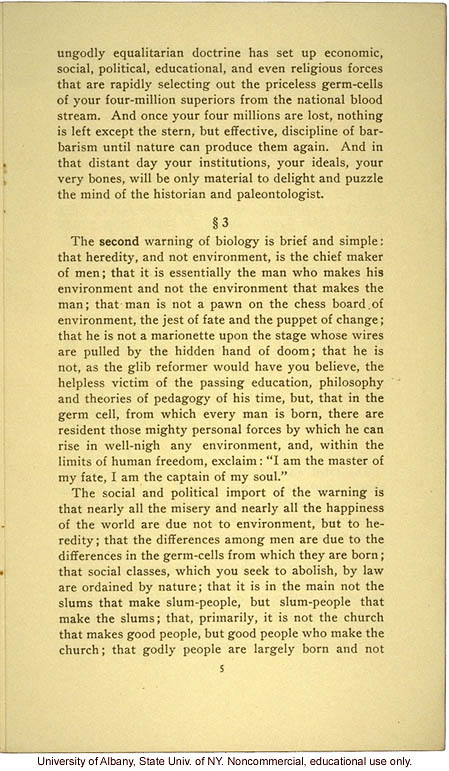ungodly egalitarian doctrine has set up economic, social, political, educational, and even religious forces that are rapidly selecting out the priceless germ-cells of your four-million superiors from the national blood stream. And once your four millions are lost, nothing is left except the stern, but effective, discipline of barbarism until nature can produce them again. And in that distant day your institutions, your ideals, your very bones, will be only material to delight and puzzle the mind of the historian and paleontologist.
[section symbol] 3
The second warning of biology is brief and simple; that heredity, and not environment, is the chief maker of men; that it is essentially the man who makes his environment and not the environment that makes the man; that man is not a pawn on the chess board of environment, the jest of fate and the puppet of change; that he is not a marionette upon the stage whose wires are pulled by the hidden hand of doom; that he is not, as the glib reformer would have you believe, the helpless victim of the passing education, philosophy and theories of pedagogy of his time, but that in the germ cell, from which every man is born, there are resident those mighty personal forces by which he can rise in well-nigh any environment and, within the limits of human freedom, exclaim: "I am the master of my fate, I am the captain of my soul."
The social and political import of the warning is that nearly all the misery and nearly all the happiness of the world are due not to environment, but to heredity; that the differences among men are due to the differences in the germ-cells from which they are born; that social classes, which you seek to abolish, by law are ordained by nature; that it is in the main not the slums that make slum-people, but slum-people that make the slums; that, primarily, it is not the church that makes good people, but good people who make the church; that godly people are largely born and not
5
[end]


